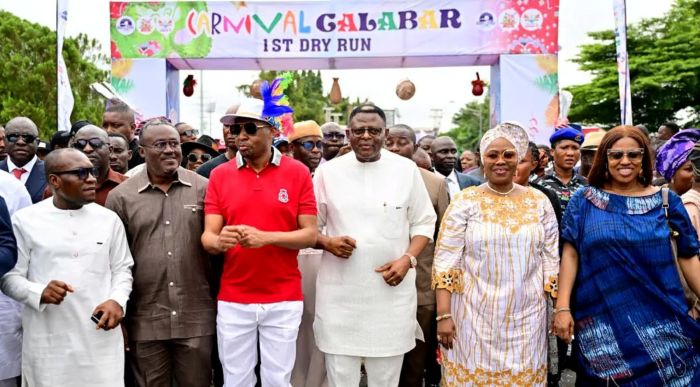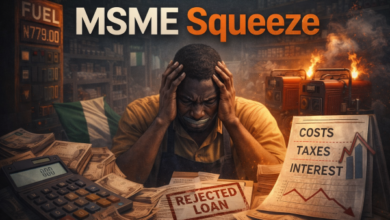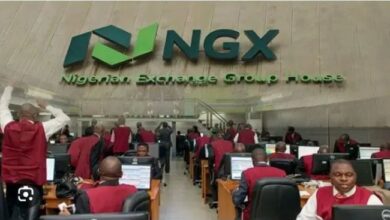Otu Flags Off 2025 Calabar Carnival Dry-Run — A 20-Year Celebration of Culture, Creativity, and Commerce
The rhythmic drums of Calabar once again signaled the return of Africa’s most spectacular street parade as Governor Bassey Otu officially launched the 2025 Calabar Carnival Dry-Run, marking the start of the 20th anniversary of Nigeria’s most celebrated cultural export.

Held at the scenic Millennium Park in the Cross River capital, the flag-off was more than just a ceremonial prelude—it was a declaration of continuity, reconciliation, and creative rebirth for a festival that has become synonymous with Nigeria’s cultural tourism brand.
The Business of Culture: 20 Years of Africa’s Street Spectacle
Governor Otu, visibly elated, described the 2025 edition as a “historic convergence of reconciliation, cultural revival, and global attraction.”
He noted that the Calabar Carnival—often dubbed Africa’s Biggest Street Party—has evolved from a state initiative into a continental brand that fuels Nigeria’s creative economy, generates seasonal employment, and positions Cross River as a key tourism and investment hub.
“This year’s theme, ‘Traces of Time,’ captures our collective journey through culture, creativity, and transformation,” Otu said. “You will see your heritage beautifully displayed here in Calabar, the home of culture and hospitality. The world must know that the Season of Sweetness is not only about governance—it is about joy, unity, and the enduring power of culture.”
With the 20th anniversary edition, the Carnival Calabar brand is entering a new era—one that aims to deepen its international reach, expand partnerships across the global tourism ecosystem, and reinforce Nigeria’s soft power through art, fashion, music, and performance.
Calabar Carnival: From Local Vision to Global Phenomenon
Launched in 2004 under then-Governor Donald Duke as part of a strategy to diversify Cross River’s economy, the Calabar Carnival has grown into a multi-billion-naira enterprise attracting thousands of tourists, investors, and creatives from over 30 countries annually.
Over two decades, it has become a living laboratory of Nigeria’s cultural diplomacy, inspiring sister festivals across Africa and helping to sustain thousands of small businesses—from costume designers and artisans to hoteliers, transporters, and digital marketers.
The 2025 edition is particularly significant, marking two decades of uninterrupted celebration—an achievement few African cultural events can boast. Despite political transitions and economic headwinds, the festival has retained its vibrancy, reaffirming its status as a model for creative economy resilience.
‘Traces of Time’: Celebrating the Past, Designing the Future
This year’s theme, “Traces of Time,” is a poetic reflection on legacy and evolution. It invites participants to revisit their roots while imagining the cultural future of Africa. For many, it symbolizes the journey of Calabar itself—from colonial trade port to cultural capital—and the rise of a community that continues to harness creativity as a catalyst for economic and social transformation.
Governor Otu emphasized that the 2025 carnival is designed to be “a spectacular blend of nostalgia, innovation, and inclusion.”
“We have the biggest street party right here in Calabar,” he declared. “The entire world is welcome to join us. If you do not come, you will miss too much. This year’s carnival will show that culture is not just about celebration—it is a serious driver of growth, tourism, and unity.”
Economic and Cultural Impact: Beyond the Parades
Beyond its dazzling floats and flamboyant costumes, Carnival Calabar remains a key contributor to Cross River State’s non-oil GDP. Each edition reportedly injects billions into the local economy, sustains over 15,000 direct and indirect jobs, and boosts revenue across hospitality, transport, and media sectors.
Tourism analysts note that every “Dry Run” leading up to the December finale doubles as both a rehearsal and economic simulation—testing logistics, crowd control, and hospitality readiness for the surge of visitors expected during the grand parade.
BRANDECONOMY’s review of past carnivals shows that small businesses thrive most during this period, with the hospitality and retail sectors recording up to a 60% revenue spike compared to off-season months.
With renewed government commitment and private-sector participation, the 2025 edition is projected to surpass all previous benchmarks in visitor turnout, economic impact, and international visibility.
Sustaining the Brand: Creativity Meets Governance
Governor Otu commended band leaders, creative directors, and stakeholders for their resilience in sustaining the Calabar Carnival brand despite Nigeria’s economic challenges. He pledged stronger institutional support for the state’s creative industries, emphasizing their role in job creation, youth empowerment, and image-making for Nigeria.
“Our creative economy is the heartbeat of our state’s diversification agenda,” he said. “As we celebrate 20 years of this great tradition, we must make it a global symbol of African pride and excellence.”
Dignitaries present at the launch included members of the National Assembly, traditional rulers, representatives from the Federal Ministry of Tourism, and delegates from across West Africa. Their attendance reinforced the festival’s growing influence as a pan-African platform for cultural and economic diplomacy.
BRANDECONOMY Insight: The Carnival as an Economic Engine
For Cross River State, the Calabar Carnival is more than a celebration—it is a strategic tool for urban regeneration and economic repositioning. Each year, the event transforms Calabar into a global stage, attracting investors, media networks, and cultural institutions.
In an era where nations are redefining growth beyond oil, creative industries like Carnival Calabar are shaping Nigeria’s emerging economic identity. The festival stands as proof that culture—when properly structured and marketed—can drive sustainable prosperity and social cohesion.
As the drums roll and the dancers rehearse for December’s grand spectacle, one truth remains clear: the Calabar Carnival is not merely a festival. It is Nigeria’s creative economy in motion—vibrant, inclusive, and globally resonant.







